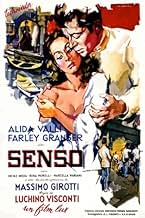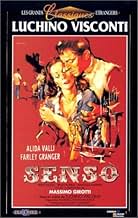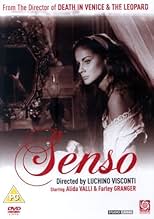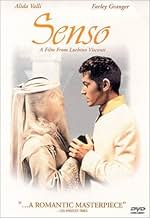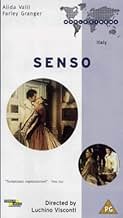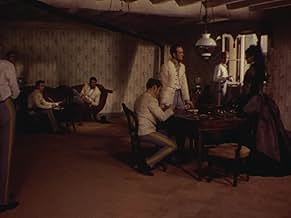AVALIAÇÃO DA IMDb
7,4/10
9,6 mil
SUA AVALIAÇÃO
Na segunda metade do século XIX, durante a guerra de unificação italiana contra a Áustria, uma condessa italiana se envolve emocionalmente com um soldado austríaco, arriscando trair a causa ... Ler tudoNa segunda metade do século XIX, durante a guerra de unificação italiana contra a Áustria, uma condessa italiana se envolve emocionalmente com um soldado austríaco, arriscando trair a causa italiana.Na segunda metade do século XIX, durante a guerra de unificação italiana contra a Áustria, uma condessa italiana se envolve emocionalmente com um soldado austríaco, arriscando trair a causa italiana.
- Direção
- Roteiristas
- Artistas
- Prêmios
- 3 vitórias e 2 indicações no total
Franco Arcalli
- Un soldato
- (não creditado)
Aldo Bajocchi
- Un soldato
- (não creditado)
Ottone Candiani
- Un soldato
- (não creditado)
Nando Cicero
- Un soldato
- (não creditado)
Claudio Coppetti
- Un soldato
- (não creditado)
Cristoforo De Hartungen
- Il generale Hauptmann
- (não creditado)
Tony Di Mitri
- Un soldato
- (não creditado)
Avaliações em destaque
Opens with a lush rendition of Il Trovatore at Teatro La Fenice, SENSO is an ostentatious melodrama imprinted with Visconti's pronounced blue blood opulence, retells an Italian countess' (Valli) vain and poignant attempt to pursue her one-sided affection to an Austrian officer (Granger shines in the rich Technicolor palette as an Adonis), whose misogyny and promiscuity will cause his own doom and mar her mentality up to the hilt.
The film sets its time during the fall of Austrian occupation in Venezia 1866, Valli is wavering between her bureaucratic husband (Moog) and rioting cousin (Girotti), to break loose from the stalemate, she irrevocably falls for a young lieutenant in the opponent camp, but he is no knight in shining armor but a foul and spineless scoundrel with irresistible sheen of deadly charm. Granger's gorgeous lover-boy image is a quintessential smokescreen to veil his despicable innards, but after all, it is a consensual deal despite of Valli's false hope, more significantly its anti-war signals have been forcibly cast by Granger's self-abandonment and the lousy war battlefield experienced by Girotti, which, more plausibly it is an intentional move by Visconti, a distraction from the central turmoil, but done with a tinge of amateurish fecklessness.
Valle shoulders on a profound effort to scrutinize a woman's inscrutable sexual desire which being repressed for too long, both she and Granger align themselves with Visconti's brimful-of- emotion style (again, thanks to Techincolor and the overstuffed score as well) which approximate the OTT threshold in certain degree, although falling out with Visconti eventually, Granger succeeds in bringing about his best screen persona and it was such a great era when a gay man can play an outright straight womanizer on the celluloid.
On the one hand SENSO fails to impress me as my favorite among Visconti's work of art, and scale-wise pales by comparison with LUDWIG (1972, 8/10) and THE LEOPARD (1963, 8/10), but on the other hand, only Visconti can flaunt such an overbearing melodrama with true mettle and without any compromise, a trend-setter would inspire later kindred spirits, for instance Baz Luhrmann's 3D adaption of the bourgeois sumptuosity THE GREAT GATSBY (2013, 8/10).
The film sets its time during the fall of Austrian occupation in Venezia 1866, Valli is wavering between her bureaucratic husband (Moog) and rioting cousin (Girotti), to break loose from the stalemate, she irrevocably falls for a young lieutenant in the opponent camp, but he is no knight in shining armor but a foul and spineless scoundrel with irresistible sheen of deadly charm. Granger's gorgeous lover-boy image is a quintessential smokescreen to veil his despicable innards, but after all, it is a consensual deal despite of Valli's false hope, more significantly its anti-war signals have been forcibly cast by Granger's self-abandonment and the lousy war battlefield experienced by Girotti, which, more plausibly it is an intentional move by Visconti, a distraction from the central turmoil, but done with a tinge of amateurish fecklessness.
Valle shoulders on a profound effort to scrutinize a woman's inscrutable sexual desire which being repressed for too long, both she and Granger align themselves with Visconti's brimful-of- emotion style (again, thanks to Techincolor and the overstuffed score as well) which approximate the OTT threshold in certain degree, although falling out with Visconti eventually, Granger succeeds in bringing about his best screen persona and it was such a great era when a gay man can play an outright straight womanizer on the celluloid.
On the one hand SENSO fails to impress me as my favorite among Visconti's work of art, and scale-wise pales by comparison with LUDWIG (1972, 8/10) and THE LEOPARD (1963, 8/10), but on the other hand, only Visconti can flaunt such an overbearing melodrama with true mettle and without any compromise, a trend-setter would inspire later kindred spirits, for instance Baz Luhrmann's 3D adaption of the bourgeois sumptuosity THE GREAT GATSBY (2013, 8/10).
Whatever Anton Bruckner had in mind when writing his majestic Seventh Symphony, it probably wasn't as the score to a postwar Italian love story set during the Italian-Austrian conflicts of the Risorgiamento. Though the use of pre-existing classical music as backdrop for films is to be discouraged, here it works in surprising ways. Alida Valli is the Countess Livia Serpieri, in a loveless marriage to an older, collaborationist official. At the opera (Venice's La Fenice during Il Trovatore!) she meets up with a dashing young Austrian officer, Farley Granger. (Digression: After a handful of American films -- They Live by Night, Rope, Side Street, Strangers on a Train -- Granger journeyed to Italy to work with Visconti then fell off the screen for years, only to resurface in a few schlock films in the late 60s and early 70s. What happened to him?) They kindle up a clandestine and dangerous affair -- the wealthy older woman and the manipulative wastrel. After wheedling a small fortune out of her to bribe a doctor who declares him unfit to serve, he dumps her. But hell hath no fury....Luchino Visconti, assisted by the young Franco Zeffirelli -- both were opera directors, too -- pulls out all the stops, ending with a finale reminiscent of Tosca (but with a twist). Senso is a shameless and unforgettable wallow in Italianate passion -- unabashed verismo translated to the silver screen.
This has to be one of my all time old favorite Romantic Motion Picture.
Visconti brings about Magic and beauty onscreen making every shot a glamour in experience!
There are so many great moments in Senso that it will take you ages before this Picture wears out in your memory.
Besides the fact that Visconti is one of the great Film-makers of all times it has to be said that this Director simply had a feel about shots to form a scene to imprint that exact emotion or feeling that was intended by him. He always knew to capture and captivate the viewer and bring about that special bond which nowadays we have lost with contemporary Motion Pictures!
For all out there whom enjoy the Art of Film-making, for all whom cherish good Film-making, go fetch "Senso"! It's an experience not to forget!
Senso is about the magic which comes about when a Picture finds it's way through the Projector unto the White screen! It's an experience rarely seen but so is this Art which is only understood by a handful of Film-makers!
Luchino Visconti, I thank you for this venture and understanding of the greatest Art form in this Universe!
Visconti brings about Magic and beauty onscreen making every shot a glamour in experience!
There are so many great moments in Senso that it will take you ages before this Picture wears out in your memory.
Besides the fact that Visconti is one of the great Film-makers of all times it has to be said that this Director simply had a feel about shots to form a scene to imprint that exact emotion or feeling that was intended by him. He always knew to capture and captivate the viewer and bring about that special bond which nowadays we have lost with contemporary Motion Pictures!
For all out there whom enjoy the Art of Film-making, for all whom cherish good Film-making, go fetch "Senso"! It's an experience not to forget!
Senso is about the magic which comes about when a Picture finds it's way through the Projector unto the White screen! It's an experience rarely seen but so is this Art which is only understood by a handful of Film-makers!
Luchino Visconti, I thank you for this venture and understanding of the greatest Art form in this Universe!
Italy is still probably in ruins of war at this point, real or figurative, so what does this filmmaker do, Visconti? By waving his wand, he conjures up an earlier Italy, also in the throes of occupation and war, it's the last days of the Austrian occupation around Venice, but now it can all be placed in the safer distance of history, set up as operatic melodrama on a stage.
You'll see this self-referential waving of the hand in the just the opening scene. We open in an opera house in the middle of a play, with actors on stage valiantly rushing to weapons. As soon as the play is over, patriot viewers rain the place down with revolutionary pamphlets.
It is an operatic play that we see; film as opera. Up on this stage, collaboration with a regime can be safely contained in a love affair, rich countess falling for the dashing Austrian lieutenant. In the usual melodramatic passion, she risks all. The whole point of the story is to have moments like when news reach her of a battle won against the Austrians, but instead of rejoicing at liberation, she must look terrified because her beau might have been on that battlefield.
It's not something I can get excited about, nor would I recommend you go out of your way to find it, except as contrast to other, more pertinent things about how a viewer can be choreographed through space. I mean, here is a cinema of vistas and gestures. When a camera pans around a room that someone walks in, it's just this room that we see. War is suddenly introduced as a series of vistas with crowds rushing about, filmed in a disjointed way in order to convey chaos and mobilization and yet they manage to look placid and painterly.
But how about this? It ends with another self-referential note but now one that waves away illusion, dispels fiction. Having risked all, she finds out he's not the dashing hero of operas that she wanted him to be.
Up on this stage, turning your back on your countrymen is only the innocent fallout of passion, all because you maybe yearned for some of the romance of stories from the past.
You'll see this self-referential waving of the hand in the just the opening scene. We open in an opera house in the middle of a play, with actors on stage valiantly rushing to weapons. As soon as the play is over, patriot viewers rain the place down with revolutionary pamphlets.
It is an operatic play that we see; film as opera. Up on this stage, collaboration with a regime can be safely contained in a love affair, rich countess falling for the dashing Austrian lieutenant. In the usual melodramatic passion, she risks all. The whole point of the story is to have moments like when news reach her of a battle won against the Austrians, but instead of rejoicing at liberation, she must look terrified because her beau might have been on that battlefield.
It's not something I can get excited about, nor would I recommend you go out of your way to find it, except as contrast to other, more pertinent things about how a viewer can be choreographed through space. I mean, here is a cinema of vistas and gestures. When a camera pans around a room that someone walks in, it's just this room that we see. War is suddenly introduced as a series of vistas with crowds rushing about, filmed in a disjointed way in order to convey chaos and mobilization and yet they manage to look placid and painterly.
But how about this? It ends with another self-referential note but now one that waves away illusion, dispels fiction. Having risked all, she finds out he's not the dashing hero of operas that she wanted him to be.
Up on this stage, turning your back on your countrymen is only the innocent fallout of passion, all because you maybe yearned for some of the romance of stories from the past.
A feast for the eyes this lush melodrama may be an acquired taste for some but I doubt anyone could say it wasn't visually stunning. Venice is rendered so beautifully you will want to hop the next flight there and with the composition of all the other scenes it is like watching a story take place inside of paintings. However as gorgeous as all that is it also can be distracting and take you out of the story as you study the detail which at times feels a bit surreal. Having only seen Alida Valli in her English language films where she often seemed stiff and ill at ease her performance here is quite a revelation. She is fully in command of the screen and her anguished turmoil is compelling to watch. Farley is not bad although his part really doesn't offer him much more than being a slick and very handsome wastrel.
Você sabia?
- CuriosidadesThe film opens in La Fenice, the Venice opera house. La Fenice was destroyed by arson in 1996, but reopened in 2003. Enlarged frames of this movie were used as a reference in reconstructing it.
- Citações
Il tenente Franz Mahler: It's too late! It's over! I'm not your romantic hero!
- Versões alternativasTwo versions of the film are available on video.
- One version is missing the scene where Livia tries to explain where all the money meant for the troops went.
- Another version is missing the climatic battle sequence between the Austrian and Italian troops.
- ConexõesEdited into Histoire(s) du cinéma: La monnaie de l'absolu (1999)
- Trilhas sonorasSinfonia N. 7 in mi maggiore (7th Symphony)
Music by Anton Bruckner
Performed by Orchestra Sinfonica Nazionale della Rai
Conducted by Franco Ferrara
Principais escolhas
Faça login para avaliar e ver a lista de recomendações personalizadas
- How long is Senso?Fornecido pela Alexa
Detalhes
- Data de lançamento
- País de origem
- Idiomas
- Também conhecido como
- Senso - Sedução da Carne
- Locações de filme
- Teatro La Fenice, Veneza, Vêneto, Itália(opening scenes)
- Empresa de produção
- Consulte mais créditos da empresa na IMDbPro
Bilheteria
- Orçamento
- ITL 700.000.000 (estimativa)
- Faturamento bruto nos EUA e Canadá
- US$ 27.723
- Fim de semana de estreia nos EUA e Canadá
- US$ 3.984
- 28 de out. de 2018
- Faturamento bruto mundial
- US$ 27.723
- Tempo de duração
- 2 h 3 min(123 min)
- Cor
Contribua para esta página
Sugerir uma alteração ou adicionar conteúdo ausente

![Assistir a Trailer originale italiano [OV]](https://m.media-amazon.com/images/M/MV5BYzc0Y2MyOGMtMzg0My00Mzc4LWIwYjItZjg1ZDhmMDZmOTlkXkEyXkFqcGdeQXRodW1ibmFpbC1pbml0aWFsaXplcg@@._V1_QL75_UX500_CR0)

